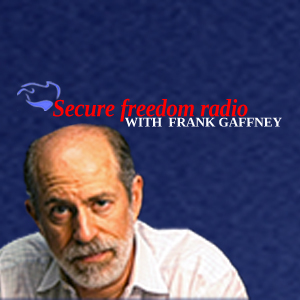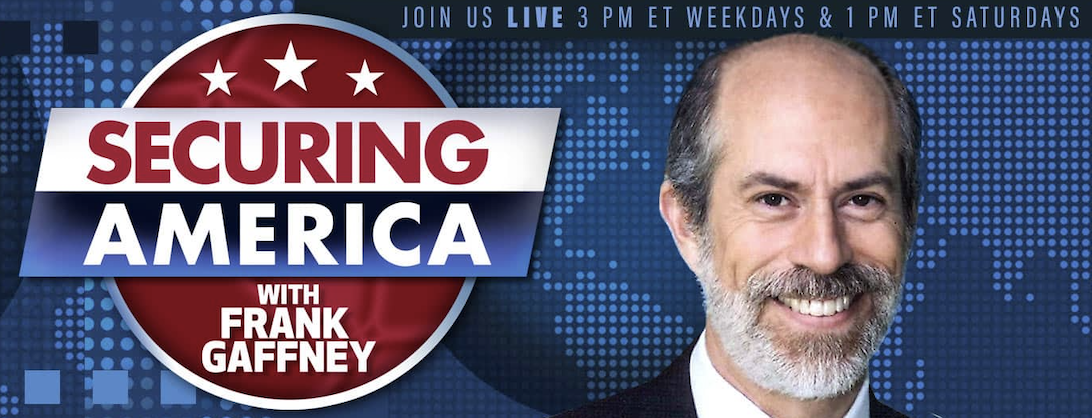Episodes

Thursday Apr 26, 2012
Michelle VanCleave, Eric Stackelbeck, Robert Muise, Roger Noriega
Thursday Apr 26, 2012
Thursday Apr 26, 2012
MICHELLE VAN CLEAVE
· Michelle joins Frank to discuss her recent piece in the Wall Street Journal about Russian spies as well as comments made by Vice President Joe Biden to Mitt Romney in respect to the same.
· The Russian intelligence presence in the United States is as extensive and high in numbers as it was during the height of the Cold War. The last arrest made in connection to Russian spying was made in 2001. Is the administration closing its eyes to the Russian intelligence presence in the country?
ERIC STACKELBACK
· Eric points out that this is not a war on terror, terrorism is only a tactic motivated by Islamist ideology. The most dangerous of all the jihads is the civilization jihad and the masters of which are the Muslim Brotherhood.
· Muslim Brotherhood operatives are penetrating and influencing the United States government. Why does the government seem clueless?
ROBERT MUISE
· An expert in Constitutional law and a Marine by background examines the hearing on the Arizona law. Arizona can and is doing whatever it can under the Constitution to protect the people in the state. Is this a Constitutional crisis?
· U.S. government’s ownership of AIG, a company that is the world’s largest purveyor of Sharia compliant insurance products raises the question of who is influencing who. Is this becoming a part of a pattern of extra constitutional behavior? Muise points out that the current administration is taking actions that are so contrary to the Constitution.
ROGER NORIEGA
· A visiting fellow at the American Enterprise Institute, shares his opinion about the Arizona law and the current hearing. Noriega points out that our immigration system has not kept up with the economic side of things hence the problem has deteriorated over time.
· Will the sympathy for illegal immigrants outweigh the need for securing the border and the society?

Thursday Apr 19, 2012
Roger Noriega, Rand Paul, Janice Kephart, Nonie Darwish
Thursday Apr 19, 2012
Thursday Apr 19, 2012
ROGER NORIEGA
- Roger Noriega, former U.S. ambassador to the Organization of American States, talks about President Obama’s participation at the Summit of the Americas where the decriminalization of drugs and the possibility of including Cuba in the next Summit were at issue. Did the U.S. lead in setting the priorities for this Hemispheric agenda?
- Noriega also addresses the importance of supporting the Mexican Government in the drugs war lead by The Zetas and the coming Presidential elections in Mexico.
SENATOR RAND PAUL
- Kentucky Senator Rand Paul sheds light on halting aid to Egypt. Egypt arrested pro-democracy workers and prosecuted them in December, 2011. The United States paid around $4 million for their release. Egypt received aid from the U.S. then immediately demanded that Interpol extradite the aid workers back to Egypt for their prosecution.
- Senator Paul shares his thoughts on the Law of the Sea Treaty, and explains how our soldiers and sailors could be vulnerable to the jurisdiction of a foreign body.
Janice Kephart
- Janice Kephart, Director of National Security Policy for the Center for Immigration Studies, addresses Massachusetts’s lack of commitment on following the REAL ID Act by not checking legal status on drivers’ license requests.
- What will the implications be of the Obama administration’s order to remove U.S military forces from the Mexican border?
NONI DARWISH
- The director of Former Muslims United discusses her new book “The Devil You Don’t Know.” Learn why the problems Middle Eastern regimes like Egypt’s are much deeper than just ridding the countries of their tyrannical dictators.
- Egypt’s hope of democracy will be crushed if the Muslim Brotherhood comes to power. The Muslim Brotherhood is not the secular organization they portray, yet the U.S. has sent them $1.5 billion in aid. Is the current administration supporting the Muslim Brotherhood at the expense of establishing democracy in Egypt?

Wednesday Apr 11, 2012
Sylvia Longmire, Roger Noriega, Amb. Yoram Ettinger, Jim Hanson
Wednesday Apr 11, 2012
Wednesday Apr 11, 2012
Sylvia Longmire, a retired Air Force captain and former Special Agent with the Air Force Office of Special Investigations, provides analysis on Mexico and the influence of drug cartels in the coming elections.
Are the advisors of Venezuela’s Hugo Chavez already acting like he’s dead? What will happen to Venezuela when Chavez actually dies? Former U.S. ambassador to the Organization of American States, Roger Noriega, of the American Enterprise Institute weighs in.
Former Israeli Ambassador Yoram Ettinger contributes with his take on the Muslim Brotherhood’s rise to power in Egypt and the rest of the Middle East. Ambassador Ettinger explains how the Muslim Brotherhood supports Islamic terrorist organizations as well as terrorist cells.
Jim Hanson asses the US deal to give Afghani judges veto power over the US operations. Is President Obama endangering the U.S military by bargain with the enemy?

Friday Mar 23, 2012
Fred Grandy, Robert McFarlane, Roger Noriega, Bill Gertz
Friday Mar 23, 2012
Friday Mar 23, 2012
By U.S. law, Congress has mandated that the administration condition military aid to Egypt on observance of human rights. Secretary of State Hilary Clinton was able to waive this requirement in order to send over a billion dollars to the Islamist Muslim Brotherhood by citing national security. This is in spite of gross human rights violations against Coptic Christians and other Muslim and non-Muslim religious minorities. Former Congressman Fred Grandy joins Frank to discuss this and the plight of the Coptic Christians in Egypt and the non-indictments of Palestinian terrorists freed in the Gilad Shalit trade.
Former Reagan National Security Advisor, Robert McFarlane talks energy, gas prices, and the vulnerability of strategic oil refineries to terrorist attacks. Find out what the realistic alternatives are and what it would take to get fuel choices to the market place.
It seems that the Pope does not plan to visit with dissidents during his visit to Cuba. Such an action would give de facto political legitimacy to the Stalinist regime in Cuba. Former Assistant Secretary of State, Roger Noriega, lays out the consequences. He also discusses the state of play in Venezuela and the latest on Hezbollah’s ever increasing presence in Latin America and now in the United States.
Bill Gertz of the Washington Times and the Washington Free Beacon, reports on rumours of a coup in China, U.S. failure to prevent China from obtaining our missile technology, and the future of U.S. nuclear testing.

Thursday Mar 15, 2012
Diana West, Amb. John Bolton, Rep. Doug Lamborn, Roger Noriega
Thursday Mar 15, 2012
Thursday Mar 15, 2012
Part of the new Afghan strategy is to not just minimize civilian casualties, but also completely eliminate them. Obama focuses more on civilian deaths at the hands of US troops than civilian deaths at the hands of the Taliban. US forces account for 7% of civilian deaths while the Taliban are responsible for 93% yet no one talks about this. Diana West tries to explain why the US government only focuses on American faults instead of triumphs and why they hold their own troops accountable while giving the Taliban a pass to do as they please.
Space is the final frontier and America needs to play a dominant role in that frontier. Former Ambassador John Bolton claims the Obama Administration is doing their part to ensure that not only does America not play a role in space, but also allow our enemies use space to their strategic advantage.
Congressman Doug Lamborn details how the Chinese are corning the market on rare earth minerals. These minerals are used in electronics such as flat screen televisions and military equipment. China owns about 95% of these minerals, so what is the Obama Administration going to do about this monopoly?
Hezbollah is active in Latin America, Iran is pushing for more influence in the region and more and more democracies are crumbling. What is the future of Latin America and can the United States help mold this important region into a thriving democracy? Roger Noriega gives his take on the sad future of America’s front-yard.

Thursday Feb 23, 2012
Peter Pham, Janice Kephart, Robert McDowell, Roger Noriega
Thursday Feb 23, 2012
Thursday Feb 23, 2012
Peter Pham analyzes the situation in Somalia with regards to the presence of African Union troops in Mogadishu, and the professional turnaround of fighting a counter insurgency. Will Somalia overcome Al-Shabab with assistance from the African Union troops or should the U.S. and NATO play an active role in the region? Pham touches on the issue of Boko Haram in Nigeria and their alliance with Al-Qaeda and Al-Shabab to over throw the government and create a Christian free zone in the north. Will we start to see a persecution of Christians in Nigeria?
The REAL ID Act was passed in 2005 as a result of the 9/11 Commission’s recommendations to prevent criminals and terrorists easy access to driver’s license and IDs which would conceal their identities. Janice Kephart sheds light on the REAL ID Act and why it has been difficult to implement. The Department of Homeland Security is taking no responsibility or part in the REAL ID Act and the states are receiving no guidance from DHS; should they be involved and fund states to help them implement this program effectively? Janice also talks about the pilot program between West Virginia and a private company, TechSack, which offers an extra incentive to the states to implement the REAL ID Act.
Robert McDowell, the commissioner of the Federal Communications Commission, explains that the United Nations is set to discuss internet governance in Geneva on Feb. 27, which could lead to an increased regulation of the internet by the International Telecommunications Union (created to regulate and facilitate international communication). McDowell holds that this would be a dangerous step toward censorship and cautions that it could inhibit web innovation. Shouldn’t it worry us that countries such as China and Russia are leading the charge for tougher internet regulations?
Venezuelan President Hugo Chávez has a strong weapon in his tough 2012 re-election campaign against a united opposition lead by Henrique Capriles: a multibillion dollar oil-for-credit deal with China. Chávez’s deal lets China secure oil supplies for its fast-growing economy and gives President Chávez a source of funds that he can use to fund politically popular programs and one that is free from omission; right in time when he is facing a strong opponent that threatens to end his dictatorship. Roger Noriega joins us today to provide clear analysis on the direction the Venezuelan government is taking and how dangerous this coalition between China and Venezuela is for the global democracy.

Tuesday Feb 14, 2012
Riki Ellison, Roger Noriega, Eric Schmitt, Andy McCarthy
Tuesday Feb 14, 2012
Tuesday Feb 14, 2012

Thursday Feb 02, 2012
Gen. Jerry Boykin, Rep. Tim Huelskamp, Yoram Ettinger, Roger Noriega
Thursday Feb 02, 2012
Thursday Feb 02, 2012
Retired Army General Jerry Boykin sits down with Frank to weigh in on the repressive fire he is under from the Council on American Islamic Relations (CAIR), a Muslim Brotherhood front organization that works to promote Sharia and prevent the freedom of speech in the U.S. What is the leadership of America doing to block the influence of organizations such as CAIR? Do the Muslims in this country support the idea of replacing the Constitution with Sharia? Representative Tim Huelskamp from Kansas joins Fred Grandy for another segment of Inside the Cloakroom in order to explain his new piece of legislation called the Military Religion Freedom Protection Act. This piece of vital legislation would ensure that servicemen would be able to act on their own conscience without fear of reprisal from the leadership. These men and women stand up and fight for our freedom, we need to ensure that their religious freedom is protected. Military chaplains should not be forced to perform ceremonies that go against their own beliefs nor should they be penalized for standing up for those beliefs. What is the future of our military if the president gets his way and cuts even more of the defense budget? Yoram Ettinger speaks with Frank to highlight the situation between Israel and Iran, and what the United States’ role and responsibility is in all this. Does the U.S. support Israel’s intention to strike against Iran preemptively? Will the U.S. stand by Israel if it attacks Iran? How does Israel feel about the events taking place in Egypt? What threat does the rise of Muslim Brotherhood pose to Israel and the entire Middle East? Roger Noriega gives his analysis on the recent warnings that senior intelligence officers received that Iran is planning an attack on the United States. How does South America play a role in this threat, especially Venezuela? Does Venezuela’s instability or lack of transitional plan after Chavez work in the favor of Iran? Is the current administration responsible for emboldening Iran? Noriega then moves on to talk about China’s role in South America and how this could affect U.S. national security?

Thursday Jan 26, 2012
Victor Davis Hanson, Walter Pincus,Lt. Gen. Jerry Boykin, Roger Noriega
Thursday Jan 26, 2012
Thursday Jan 26, 2012
Victor David Hanson weighs in on the President’s State of the Union speech, specifically focusing on the question of whether or not the U.S. is really on a decline, or as the President put it “anyone who thinks that the United States is on a decline knows nothing.” Hanson then evaluates the current defense budget cuts by the current administration. Is it really a wise way to reduce the deficit? Can the U.S. maintain its military superiority? Can our allies trust and depend on us? Do we owe them any responsibilities?
Walter Pincus sits with Frank to evaluate and analyze the reliability and dependability of the Predator,Reaper and other unmanned vehicles that the government is spending billions on. Are they really reliable and dependable? Who is responsible for the lack of quality control of such important vehicles used to fight one of the most important wars for America? How does China play a role in this issue?
Retired Lt. Genral Jerry Boykin talks about the recent raid in Somalia by the Navy Seals. Should the United States troops be involved in such missions; and how would the recent defense budget cuts affect such operations? Is lily pad strategy the right solution to these dilemmas?
According to President Obama’s State of the Union address, “our ties to the Americas are deeper… anyone who tells you that America is in decline or that our influence has waned, doesn’t know what they’re talking about. ” In 2011 Iran has enjoyed more influence in Latin America than ever. In recent years (since 2005) Iran has expanded and intensified the relations and mainly their cooperation among some Latin American countries, such as Venezuela, Cuba, Ecuador, Nicaragua, Bolivia and Brazil. Roger Noriega addresses these situations and provides a deeper analysis about the situation in Latin America, the influence of Iran with special concern in Venezuela and Brazil, and the United States role as in all of these.

Thursday Jan 19, 2012
Roger Noriega, Marc Thiessen, Rep. Buck McKeon, Gordon Chang
Thursday Jan 19, 2012
Thursday Jan 19, 2012
Ambassador Roger Noriega joins Frank to analyze the role of Iran in Venezuela and the rest of the Latin American region, and how this relationship could affect the United States. Will Latin America wake up and realize that Iran is the real aggressor? Also, Ambassador Noriega talks about the threat to the United States from the relationship between China and Panama. What will happen if the United States loses its allies in Latin America? Can we afford to ignore this threat in our own backyard?
Marc Thiessen sheds light on the incident of Al-Qaeda’s training manual magazine ‘Inspire’ being found at Guantanamo Bay, with one of the Al-Qaeda detainees. How did this anti-U.S. magazine get into a secure facility? Who is responsible for smuggling it to the detainees? Are the detainees at Gitmo getting more privileges than they should? If yes, is it justified? He concludes with his thoughts on the military tribunals under the new guidelines by the administration.
Congressman Buck McKeon, Chairman of the House Armed Services Committee, spends time with Frank to give his analysis on the president’s recent hollowing out of the military. You can’t just take money from the military because you don’t like what they do or because you want to give people more benefits. America has global responsibilities and our military needs to meet them. The president took the money out of the defense budget, and then built a strategy around what was left instead of making a strategy and building a budget around that. Obama is not saving money; he is just putting it into other programs so how is that really helping our deficit? What is the cost to American security as a result of the president cutting into the bone of the defense budget?
Gordon Chang, expert on Asian affairs, weighs in on the recent rumors of coup attempts in China and provides a brief ‘behind the scenes’ analysis. Is the Chinese military gaining more power over the civilians and diplomats? What does this mean for the U.S.? Gordon then goes on to talk about the implications of the recent nuclear cooperation deal between China and Saudi Arabia; as well as the Obama Administration’s Keystone pipeline decision. With the current government increasing its dependability on the Middle East for oil, will China be the ultimate winner in this situation? Would sanctions imposed by the U.S. on Iran have serious repercussions on Chinese financial institutions?

